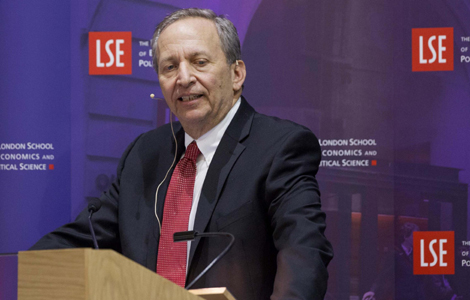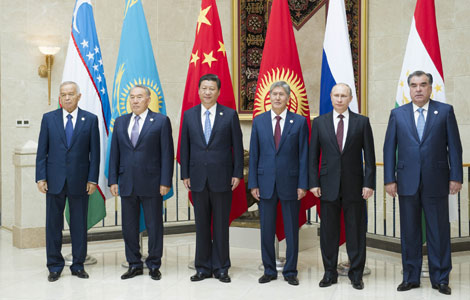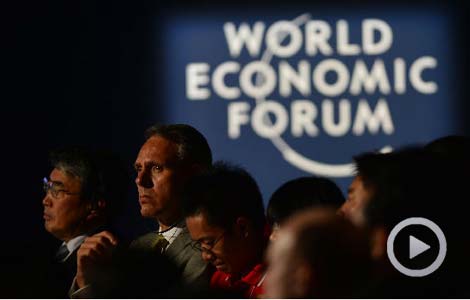China protects human rights with vigor
Updated: 2013-09-16 08:23
(China Daily)
|
||||||||
Editor's note: The Sixth Beijing Forum on Human Rights was held in Beijing on Sept 12-13. Following are excerpts of some essays presented at the forum:
Asian cooperation and development based on human rights
Qi Yanping, dean of law school in Shandong University
With the largest area, population and population density in the world, Asia is probably also the most diversified continent in terms of economy, politics and culture. It has both highly developed and developing countries. The political systems followed by countries within the region vary from each other. In terms of culture, the differences among countries are even more obvious and direct.
Thus it is not surprising that regional cooperation in Asia is also the most confusing among the five continents. On the one hand, Asia has formed some types of cooperation organizations such as the Association of Southeast Asian Nations and the Shanghai Cooperation Organization. On the other, Asia still has no widely covering cooperation mechanism with regional influence.
Then what could be the possible common ground of Asian cooperation?
Culture must be the decisive factor. No matter how many differences exist among the cultures in Asia, they are not essentially opposite. Peoples in Asia have gone through the severe test of war, especially after World War II, and reached an agreement on one culture, which is human rights culture, a culture recognizing, respecting, developing and accomplishing human beings. Therefore, I think human rights culture is the "Archimedean point" to solve the plight of Asian regional cooperation.
The reverence for life and all creatures, the persistence of freedom of conscience, the yearning for equality, the safeguarding of social justice, and the modern appeal to democracy and rule of law, embodied in all Asian cultures, are the common wealth we share in Asia.
Although countries in Asia differ greatly from each other in many aspects, they never stop making efforts to promote communication in various ways. The cultural pattern of Asia is the richest among all the continents and there has never been any artificial "cultural unity", which manifests the diversity and inclusiveness of the Asian civilization.
Human rights education in colleges
Liu Shiping, deputy director of Hunan University Research and Education Center for Human Rights
The part played by universities and colleges in human rights education is of special importance, because it directly involves well-educated people, both young and old. By setting professional schedules and recruiting experts to share their research with students, colleges can promote the value of human rights among the students.
Since the clause requiring the State to respect and protect human rights was added to China's Constitution in 2004, the State has invested huge amounts to promote human rights education in colleges and universities. In 2004, the Law School of Peking University set up the first human rights masters' program on the Chinese mainland together with the Raoul Wallenberg Institute of Human Rights and Humanitarian Law of Lund University, Sweden. Several key universities soon followed the example and offered more doctoral and masters' programs in human rights.
More universities and colleges are now offering courses in human rights under different titles, such as Hundred Years of China's Human Rights History, Human Rights for the Environment, Non-governmental Organizations for Human Rights, Rights of the Minorities, Business and Human Rights, Human Rights Theories and Diplomacy in the Modern West, and Human Rights and Relations of Big Countries.
Such colleges also play a big role in spreading human rights education in society. Guangzhou University organized a series of human rights training courses for judicial officials from 2006 to 2010. In 2008, Shantou University in Guangdong province joined hands with Guangzhou University to offer training courses in human rights to police officers in Shantou. Since April 2009, Peking University has organized 10 sessions for about 100 officials of the judiciary in Guangdong province.
Urbanization key driver of growth
Zhou Yezhong, professor at Wuhan University
In earlier waves of urbanization, rural regions saw huge population outflows as young farmers sought jobs in big cities. However, because of China's urban-rural house registration system, they were not accepted as true urban residents and could not get enough support from the system. The new generation of farmers hopes to overcome its inferiority complex by truly integrating in cities, but the limited resources in cities cannot accommodate such a big population.
The new urbanization drive offers a solution to this dilemma. By accepting farmers in industrial jobs in nearby cities, the new urbanization wave will raise the capacity of cities as a whole and accept more people. More importantly, the new urbanization drive will protect the fundamental human rights of the rural people by granting them more development opportunities.
Another factor of the new urbanization wave is the guarantee of equal social security to migrant workers. Since fewer rural workers today need to migrate to faraway regions in search of better livelihood, it is more convenient and attractive for them to join the social security system and, as a result, be ensured of getting pension in old age. Also, their children's right to education will be better protected and they can get better parental care.
In other words, the new urbanization drive is not only an innovative mode of economic development, but also a good opportunity to better promote human rights in China.
Build a sustainable human rights development environment
Chen Shiqiu, vice- president of China Society for Human Rights Studies
Directed by the "people-first" principle, all basic guidelines, development strategies and measures adopted by China basically start by respecting people's rights, protecting their interests, listening to their appeals and satisfying their demands.
Building a sustainable economic environment is critical to human rights development. Development is a prerequisite for the improvement of people's likelihood, and the material basis and guarantee of fulfilling all human rights. Development is an unalienable part of human rights. The right to development is important especially for people in developing countries.
It is the correct choice given the situation in China. China views the right to development and subsistence as the basic tenet of human rights, but that does not mean it neglects or denies the importance of other aspects of human rights. China has always held that economic rights, social rights and cultural rights are as important as individual's rights and political rights, and that all these rights are interrelated and interdependent, and cannot be separated.
After a period of extensive development since it launched reform and opening-up, China has taken the path of sustainable development based on the principle of "scientific development". Sustainable development is closely related to the right to development and all the other aspects of human rights.
Human rights cannot be protected without building an effective human rights guarantee system.
Since launching reform and opening-up, China has amended and enacted many laws to safeguard human rights, and legalized and institutionalized the constitutional principle to "respect and guarantee human rights".
China has also made an important transformation in terms of the rule of law. For example, it lays equal emphasis on the fight against crime and protection of human rights, it treats on par procedural law and substantive law, considers a suspect innocent until proved guilty, strictly prohibits torture to force a suspect to confess, and ensures a suspect gets a lawyer to defend himself/herself in a court of law.
Besides, the State supports and encourages non-governmental organizations to lawfully participate in activities to guarantee and maintain human rights. In fact, non-governmental human rights organizations, the people and news media have come together to form a social force to guarantee human rights, and partly perform functions similar to those of a State human rights department.
China is moving forward with its research to establish a human rights department at the governmental level. After such a department is established, China's human rights guarantee system will improve further .
China's human rights protection system
Yang Chengming, professor and director of Human Rights Research Center of Law School at the Beijing Institute of Technology
The letters' and visits' system is an important embodiment of China's efforts to fulfill its international commitments on human rights protection. In 1998, China officially joined the International Covenant on Civil and Political Rights, a fundamental human rights multilateral treaty aimed at fulfilling the demands of the Universal Declaration of Human Rights.
According to Article 2 of China's Regulations on Letters and Visits, which was enacted in 2005, the term "letters and visits" means that citizens, legal persons and other organizations give information, submit opinions or forward suggestions to, or lodge complaints with governments at all levels and relevant departments at or above the county level through letters, e-mails, faxes, phone calls, visits and other channels, which are dealt with by the relevant administrative departments according to law.
China's letters' and visits' system reflects the spirit and content of the International Covenant on Civil and Political Rights and has become an effective way, according to China's national conditions, of fulfilling the country's international commitment to human rights protection.
The letters' and visits' system guarantees human rights and humanitarian relief. Compared with judicial relief, the letters' and visits' system represents a bottom-up relief approach which is more convenient and less costly. Moreover, the people whose rights are violated usually occupy a comparatively dominant position in the process, which means they control the progress of relief proceedings and their requests and petitions can be responded to and addressed more quickly and effectively.
Education as fundamental human rights - case study in Tianjin municipality
Xue Jinwen, director of Center for the Study of Human Rights, Nankai University
As one of the fundamental human rights, the right to education is not only concerned with equality, but also lays the foundation for people to exercise their rights in other aspects, such as employment, politics, culture and society. Thus it is a prerequisite for many other human rights.
That's why in China we attach great significance to protecting citizens' rights to education, ensuring the priority of developing education. In Tianjin municipality, where I work, we conducted a case study on education hoping to offer a glance into the protection of education as a fundamental human right in China.
As a form of elementary education for all social members, compulsory education is considered a prerequisite for everyone to live and develop normally in a nation or society. China has a compulsory education law to protect people's human rights.
Tianjin pays a lot of attention to the development of compulsory education, particularly to equal distribution of educational resources by constructing more schools in rural regions, and regularly evaluating them to make sure rural students get equal opportunity for education. Besides, considering its annual inflow of millions of migrant workers, Tianjin has also issued regulations to protect their children's rights to receive education. Now about 140,000 such children are receiving education in Tianjin, or 18 percent of the total.
As a significant symbol of human rights development, special attention is paid to protecting the right to education for the disabled. In this field, Tianjin is also making efforts to promote educational development of three different groups of children, namely the visually challenged, the hearing impaired and intellectually challenged. During the stage of compulsory education, the admission and retention rates for physically challenged children have been stabilized at 95 percent of the total, with the rates peaking at 98 percent in 2011.
The right to education is especially important for developing countries like China, because it enhances citizens' ability for self-development and self-fulfillment. We hope the Tianjin example would serve as a model for other cities and provinces all over the country in promoting this basic human right.
South-North differences on human rights
Tom Zwart, professor of Human Rights, Utrecht University, the Netherlands
The protection of human rights is common to both developed countries and developing countries. However, their understandings sometimes differ from each other.
Developed countries often use an offensive strategy. They claim that there is only one valid human rights approach, that is, their own, which is characterized as being "universal" or "cosmopolitan", and which applies to each and every society in the same way. Consequently, other countries are held accountable on the basis of the legalism and modernity which form the core of the North's approach.
Rather than starting from the international human rights regime, developing countries tend to take their respective domestic situations as their point of departure. They respect their international obligations, but they also believe that they have to be performed in a way which takes the local cultural, social and political contexts into account. Underlying this position is the idea that human rights will be respected and supported only if it is embedded in the country's culture.
Under general international law, states enjoy discretion with regard to the implementation of treaty obligations within a given order. As long as they meet the obligations laid down in the treaty which they are signatories to, they are free to choose the most appropriate way of implementing it at the domestic level. In other words, domestic application is an obligation of result rather than an obligation of means. Therefore, the implementation of treaties, including human rights conventions, is governed by the principle of "domestic primacy".
Laws, as an integral whole, promotes human rights
Liu Huawen, assistant director of Institute of International Law, affiliated to the Chinese Academy of Social Sciences, and general secretary of the Center for Human Rights Studies, CASS
China is a large developing country and attaches great importance to economic development. Today, China follows the path of scientific development, which stresses the principle of putting people first. Based on the rule of law and with human rights as its objective, China is making great efforts to realize fair, righteous, coordinated, balanced and sustainable development.
In November 2012, the report of the 18th National Congress of the Communist Party of China reiterated that the fundamental goal of the rule by law in China is to earnestly respect and protect human rights.
The report points out that the objective of the CPC is to lead the country in building a moderately prosperous society, and the deepening of reform and opening-up include carrying out "the basic strategies for the rule of law in an all-around way to build a law-based government in the main, to constantly improve the judicial credibility, and to earnestly respect and preserve human rights".
In the process of facilitating the development of human rights, attaching importance to the rule of law means mobilizing all legal resources and giving full play to the role of law, which include safeguarding the sanctity of the Constitution, implementing laws both domestic and international, enhancing social legislation and paying attention to law enforcement. Particularly, we should adopt an all-out, open and constructive attitude toward the concept of law and its relationship with social construction, and initiate governance through soft laws. In short, all laws, as an integral whole, promote the cause of human rights.
Helping Tibetans develop their local economy
Otto Kolbl, researcher at the German Department of Lausanne University, Switzerland
Some Tibetan monks have told me that their ultimate goal was not only to pass on their cultural and religious heritage to the next generation, but also to create favorable conditions to further develop their insight into the essence of humankind and other aspects of Buddhist religion, philosophy and science.
Lay Tibetans are equally engaged in the social construction process of the region, which goes way beyond the mere "preservation" of tradition. I have not met any Tibetan hostile to outside views or some form of assistance in this process, as long as it helps fulfill their wishes.
Obviously, a good knowledge of the reasons which led to the late emergence of Tibetan-owned businesses is vital to work out a functional plan. A good knowledge of the specifics of Tibet's geography and environment is equally important to identify areas in which Tibetans enjoy a competitive edge.
It's time Western academics and media started playing a more constructive role not only with regard to Tibetans, but also with regard to ethnic minority groups in other countries. Every country that has ethnic minority groups has offered interesting solutions, but there is probably none that does not have problems.
Western countries tend to advocate more autonomy. However, most of them started implementing this principle when their ethnic minority groups were already losing their languages and identities and almost assimilated into the mainstream national culture.
It is extremely important to find ways to help ethnic minorities to develop economically while preserving and developing their languages, cultures, traditions and religions. This can allow modern nation states and multi-national states to integrate their minorities without resorting to assimilation, which would eventually threaten their existence.
Only international cooperation of all the actors mentioned above can help us move forward on this difficult path.
Development of human rights in the Internet era
He Zhipeng, professor at law school of Jilin University
The Internet and new media are helping build a new social environment, which has positive as well as negative impacts on human rights, constitutionalism and the rule of law. The Internet promotes development of human rights, but it also leads to misunderstandings and trouble. As some researchers have discovered, network evolvement promotes and has an impact on human rights protection.
On the one hand, it helps safeguard people's rights such as the right of freedom, right to equality and right to education. On the other, some rights have are still being violated, including individual rights and copyright, despite repeated prohibitory measures. Because of the high dependency on technology, the Internet has become an easy playing field for some countries that enjoy technological advantage to culturally invade other countries and indulge in cultural hegemonism.
Comparing the two aspects, it is worth paying close attention to the advancement and acknowledgement of the positive influence. The Internet's power to disseminate information quickly can propagate human rights information at a faster pace. And extensive spread of information through the Internet can lead to a boundless world so that requests for the protection of human rights can be forwarded to other countries, and international organizations and institutions.
The issue of human rights can spread among common people, and new media channels such as electronic notebooks, mobile phones and iPads can transfer information anytime and anywhere through texts, pictures and audio conversations. All of these help spread human rights information and fix problems.
Therefore, the Internet era requires distributors of social resources to govern more fairly and efficiently, fully respect and protect human rights, recognize the human rights system and problems in the era of globalization, and help build a sound system of human rights.
(China Daily USA 09/16/2013 page12)
Most Viewed
Editor's Picks

|

|

|

|

|

|
Today's Top News
USDA's OK of chicken processing challenged
US top carpet maker sets up in China
States laud lifting of ban on hardwood by China
UN chief gets report on Syria chemical weapons
Succession proves a tricky art in business
Going global? Not so easy
Japan switches off nuclear reactor
Summers withdraws from Fed chair contest
US Weekly

|

|















